#Free Buryatia
Text
Just saying seeing Tucker Carlson in Buryat traditional clothing as someone sort of PR bullshit on Russia's part knowing that Russia has been throwing Buryats into the fucking jaws of death is pretty. Disgusting.
14 notes
·
View notes
Text

[ID: Tucker Carlson, the man that inverviewed Putin, tried on a Buryat "Dagel" costume at the Russia exhibition, said the Republic of Buryatya head Alexey Tsydenov. Acocording to him, the journalist visited the republic's stand on February 5. Buryats are an indigenous people of Eastern Siberia in Russia. End ID]
Why on Earth did he think this is a good idea!?
1 note
·
View note
Text
LONG POST: About the situation in Inner Mongolia, Tuva, Kalmykia and Buryatia:
See this red piece of land here?
It’s almost as big as the actual country of Mongolia right?
…Wanna know why?

IT’S STOLEN LAND.

I am a Mongolian person from Outer Mongolia, it pains me to see my fellow siblings being subjected to a cultural genocide right now in China.
ALMOST NOBODY is talking about this.
Go ahead and search “Inner Mongolia” on any social media platform, see anything loosely related to it being stolen, or the eradication of the Mongolian language and culture in schools by the CCP?
Not much or close to none, right?
Unlike Tibet and Uyghurs, the other two biggest ethnic minorities in China, which have a number of campaigns/gofundmes/articles about the situation, there’s only a few articles about Inner Mongolia.
Do you want to know why you don’t hear about Inner Mongolia? Censorship and oppression.
Remember Tibet? And how China oppresses Tibetan Buddhism as a result, resulting in His Holiness, the Dalai Lama to leave his people’s homeland and reside in India? The biggest religion practiced in Mongolia and Inner Mongolia is Tibetan Buddhism.
I currently cannot find ANY campaigns aiming for a free Inner Mongolia, much less any recognizing what’s going on.
The Mongolic people have been the victims of genocide multiple times.
I’ve heard numerous negative opinions from foreigners online and in real life about the Mongol Empire and how “Mongolians deserve to be oppressed, China is doing them a favor, Traditional Mongolian script is used in Inner Mongolia and has a higher GDP, Outer Mongolia only uses Cyrillic.”
( Mongolia was colonized by the Soviet Union, and subjected to communism, do you know what it feels like for your own family members, brainwashed by communist propaganda during childhood, even now swearing up and down that Russians are superior and everything they do is correct. And when asked whether the innocent Mongolian Buddhist monks deserved to die at the hands of Russians, they said it was deserved?! This is how insane propaganda can get, nobody is immune)
Do you realize how fucked up that is?? To hear so many say your people deserve this??
“Mongolian is our mother language! We are Mongolian until death!” shouted ethnic-Mongolian students in China’s Inner Mongolia, in opposition to a government policy, ending bilingual education. Critics of this policy see it as the latest move in a decades’ long campaign aimed at erasing the Mongolian culture.
- PLEASE READ THESE ARTICLES, they’re not the most recent, but they tell the truth.
Why critics are asking if Inner Mongolia is the next Tibet or Xinjiang This is from 2023.

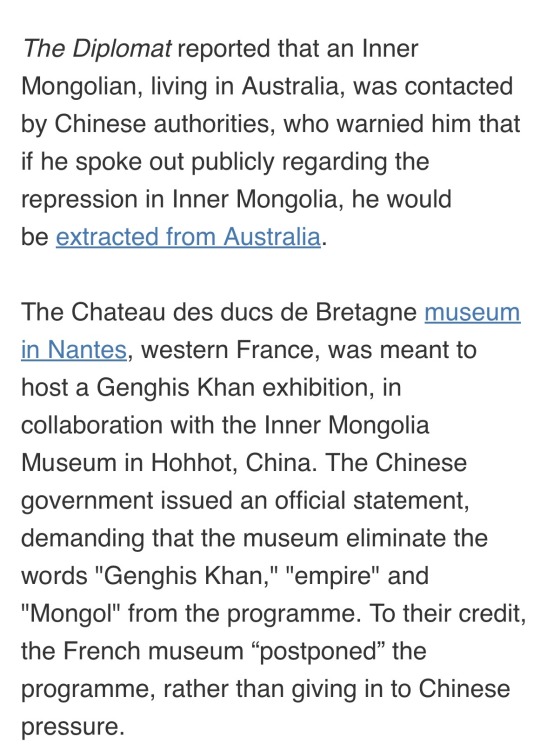
Inner Mongolia in 'War-Like State' This article is from 2011, however the events that were reported are still happening.

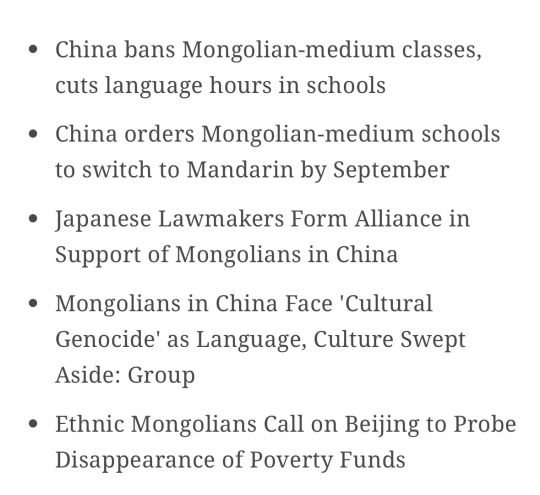
Mongolians in China Face 'Cultural Genocide' as Language, Culture Swept Aside: Group
This article is from 2021. It’s recent enough.
This goes without saying, but xenophobia is also extremely prevalent in China against ethnic minorities.
I highly recommend reading this specific tumblr post. I am also apart of many fandoms surrounding chinese media. OP makes many valid points and I cannot support them enough.
From personal experiences, I have also read about my people and Central Asians being portrayed as brutal, savage, uncivilized barbarians in many Chinese-American novels. It’s heartbreaking.
I despise how the world turns a blind eye to my brothers and sisters suffering, just because the severity of what my people endured is less than other groups, doesn’t mean that we should only focus on helping one minority, support all groups under oppression and colonialism no matter the severity of their situations.


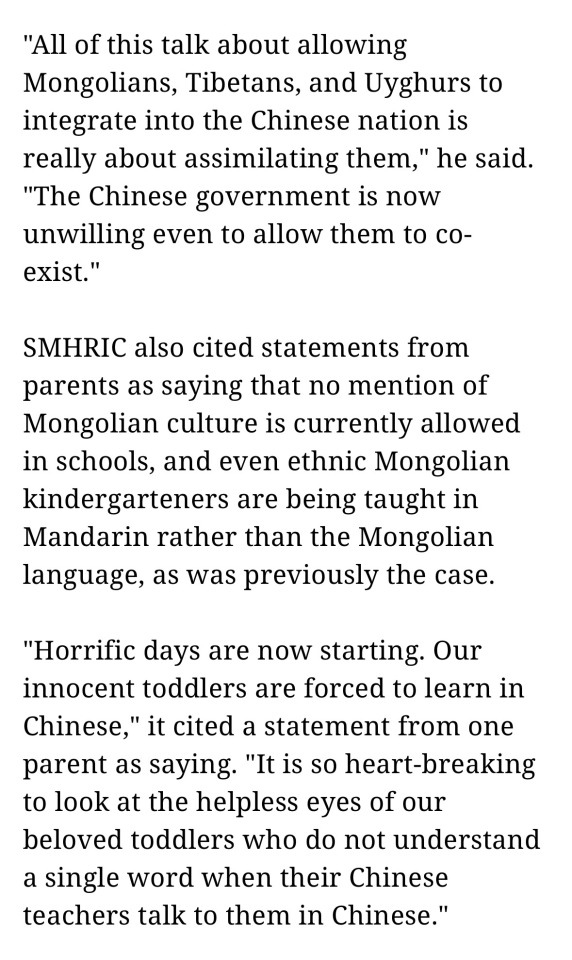
I just found this Youtube video detailing the situation in Inner Mongolia, it’s beautifully done. PLEASE PLEASE WATCH THE FULL VIDEO, Beginning to End.
Why China Doesn’t Want You To Know About This Place.
youtube
Not to mention, the countries of Tuva, Buryatia, and Kalmykia are stolen by Russia just like Inner Mongolia. Throughout its history, Russia has seized foreign lands, colonizing indigenous peoples and destroying their national identity.
Note: I am not talking about the Sakha (Yakutia) because I am personally not apart of their community and will not talk over Yakut voices regarding Yakutia such as: https://www.instagram.com/verona.petrova?igsh=MXkyMHY3NDVoZjZxMg==
https://www.instagram.com/reel/C2iRvYqvu1M/?igsh=MTFucHg5aDdjaDFocA==
instagram
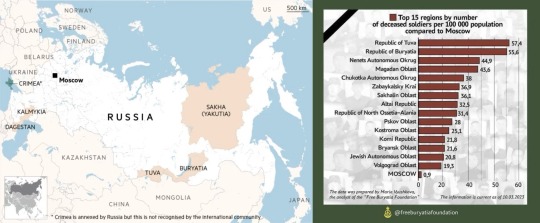
The Tuvans are a Turkic group with their own language however, they share many cultural aspects with Mongolians. Tuva is the most poverty stricken place in Russia with the lowest standards of living.
The Buryats are an ethnic minority of Siberia whose population of around half a million largely follow a blend of Buddhism and Shamanism.
They are closely related to the Mongols, and the two groups share similar histories, cultures, religious beliefs, and lifestyles.
The Buryat language is considered one of the world’s most endangered languages.
Soldiers from Tuva and Buryatia have the highest casualty rates per 100,000 for Russia in the Ukraine war.
“These are some of Russia’s poorest regions: places where many young men see the army as their only chance to earn a decent living. And it’s these places that are now paying a disproportionately high price as Russian war casualties continue to rise.”
Please see: Free Buryatia Foundation, Buryat Liberation Movement, Mass Deportation and Ethnic cleansing of Kalmykia, The Kalmyk Deportations of 1943. Ukraine war: Tuva and Buryatia pay the highest price, but latest BBC Russian casualty figures show poverty not ethnicity the key factor.
Free Palestine, Congo, Sudan, Kurdistan, Armenia, Haiti, Yemen, Tigray, Syria, Afghanistan, Myanmar, Arakan, Tamil, Eelam, Western Sahara, West Papua, Kashmir, Canary Islands, & everyone undergoing genocide / colonialism.
Spread awareness about the femicides in Kazakhstan:
The Rise of Non-Consensual Bride Kidnapping in Kazakhstan: Developing a Culturally-Informed and Gender-Sensitive Response
Kazakh Activists Urge Authorities To Toughen Punishment For Domestic Violence
Can An Ex-Minister's Arrest In His Wife's Brutal Killing Finally Bring Protections To Kazakh Women?
EurasiaChat: Gender-based violence rears its ugly head again
YOU DON'T NEED TO GO OUT AND PROTEST, SIMPLY REBLOGING, LIKING, SPREADING AWARENESS, AND REPLYING HELPS AS WELL!!!
#inner mongolia#mongolia#free inner mongolia#uyghurs#tibet#tibetan buddhism#free tibet#china#ccp#xinjiang uyghurs#xinjiang#free congo#congo genocide#congo#palestine#free gaza#free palestine#Youtube#sudan#free sudan#free west papua#yemen#free yemen#free tigray#tigray#all eyes on palestine#all eyes on gaza#all eyes on rafah#kazakhstan#genocide
25 notes
·
View notes
Text
Decided to draw the OC's of the THSC community on Tumblr as characters from the TNO universe (THSC x TNO)
I drew the oc's present in the post based on the artstyle of each blog (or at least how I interpret it) and the theme I gave to each oc. Hope ya'll like and enjoy it. I'll probably draw a second batch of THSC oc's x TNO art if I can find any oc that I can draw, if you want to be included then just dm me (or don't).
@yunaisky 's Andy Postman and Frederick Cedric x The Red Poppy Movement

"The Tyrant-Fighting Boyfriends of Roue"
@bluetorchsky 's Accordion and Violin x The Humanist

"The Music Dragons of Shostakovich"
@rarestdoge, @smoresthehalloweenqueen, and @mai-mai-lim 's ABC Trio x Siberian Black Army

"Be Gay, Do Crime!"
@caruskie 's Carus x Free Aviators
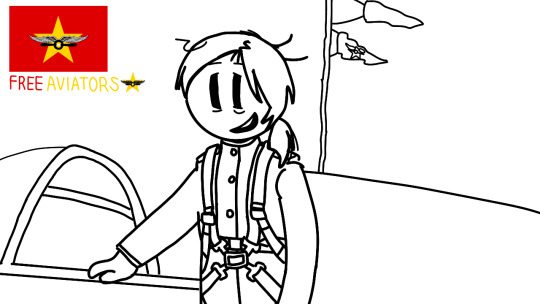
"The Witch of the Urals"
@capturecharlesau 's Danny Felizima x Governorate of the Levant

"Capitano Luce Stellare del Levante (Captain Starlight of the Levant)"
@ceresfromnationstates 's Calvin Perez x South African War (US Inteevention)
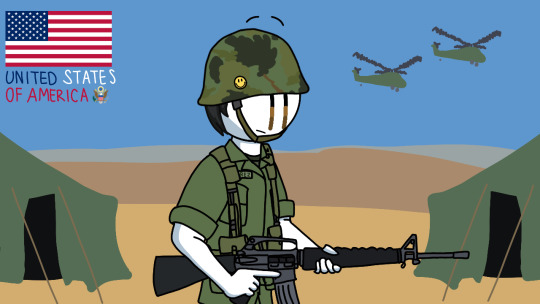
"GOOOOOOOOOOOOOD MORNING SOUTH AFRICA!!!!!!!!!"
@m1mk1d 's Max and @itz-candikin 's Lexi x Buryatia

"Le Holesom Mutineers of Sablin"
(Tbh I had fun drawing all of these, will look forward in making a project like this)
#the henry stickmin collection#thsc#henry stickmin collection#thsc au#thsc art#thsc fandom#thsc fanart#tno#the new order: last days of europe#the new order#andy postman#frederick cedrick#thsc andy#thsc frederick#thsc violin#thsc accordion#abc trio#ashley jang#brutus dan gerbreaker#cameron calvin#danny felizima#calvin perez#thsc calvin perez#lexi mary#thsc oc#henry stickmin oc
29 notes
·
View notes
Text
League of Free Nations: Indigenous activists from Russia to fight for independence from Moscow

Kalmyks in Elista, Republic of Kalmykia. Source: Wikipedia
2022/05/24 - 00:00 • INTERNATIONAL, RUSSIA, RUSSIAN AGGRESSION
Article by: Christine Chraibi
Indigenous activists from Russia, representing six national movements, have announced the creation of the League of Free Nations– a political platform for the decolonization of indigenous peoples in the Russian Federation and the acquisition of each nation’s sovereignty.
With the outbreak of the Russo-Ukrainian war on 24 February, 2022, many Russian citizens of indigenous nations have been wittingly or unwittingly drawn into the ranks of the Russian army. However, most are there because they are trying to escape the horrible poverty they experience at home and see the military as the best or in many cases only way to improve their sorry lives.
Indigenous peoples have been under the Russian yoke for centuries
Back in April 2021, Sires Bolaen (Syres Boliayen), Inyazor (Chief Elder) of the Erzya people, addressed the 20thsession of the UN Permanent Forum on Indigenous Issues, drawing attention to the Kremlin’s policy of purposeful neglect and discrimination of indigenous people.
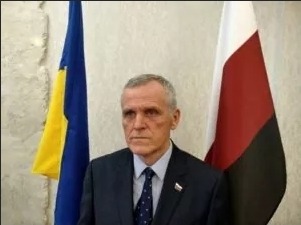
Sires Bolaen (Syres Boliayen), Inyazor (Chief Elder) of the Erzya people. Photo: open source
“Within the past 30 years, the Ezrya have been turned from a nation of a few million people into a small ethnic group on the brink of complete extinction.
Our neighbours in the Idel-Ural region – Mokshans, Udmurts, Maris, Chuvashs, Bashkirs and even Tatarsalso find themselves in a very similar position. Native peoples in Russia are forbidden to have their own political parties, or even to study their mother tongue in secondary schools. Only dancing in national costumes is tolerated. Those who stand up for their rights are persecuted as extremists and become victims of punitive psychiatry.”
The leader of the Erzya national movement is known not only for his anti-imperialist stance, but also for leading a group of Erzya volunteers fighting with the Ukrainian army. He is the co-founder of the Free Idel-Ural movement,which advocates the withdrawal of six Volga republics (Bashkortostan, Tatarstan, Chuvashia, Mordovia, Mary El and Udmurtia) from the Russian Federation and the creation of the Idel-Ural confederation.
In May 2022, Sires Bolaen once again addressed the UN Permanent Forum on Indigenous People during its 21stsession. He publicly condemned and blamed Moscow for turning federal republics and indigenous communities in Russia into socially backward and under-developed regions where local young people seek to escape poverty by joining the Russian Armed Forces.
North Ossetia, Buryatia, Tuva, Dagestan, Ingushetia, Chukotka and Idel-Ural are the regions with the highest number of dead soldiers per thousand population, he says.
Indigenous peoples gather in the League of Free Nations
In order to draw attention to the dire situation facing the indigenous people of Russia,Bashkir, Buryat, Ingush, Kalmyk, Erzya and Adyghe activistsdecided to set up a new organization – the League of Free Nations – and proceeded to issue a public announcement.
“These past few weeks, various media have been writing and talking more about the future of the Russian Federation after the Russian-Ukrainian war.
First of all, these discussions do not concern the organization of the federal subjects of the Russian Federation, but look more towards the paradigm ‘the future of the federal center is the future of Russia’.”reads the statement.
Vladimir Dovdanov, member of the Oirat-Kalmyk People’s Congressunderlines that his people have been experiencing colossal demographic catastrophes for centuries.

Vladimir Dovdanov, member of the Oirat-Kalmyk People’s Congress. Photo: Idel Realii (RFE/RL)
“…This is due to the fact that we’ve always been treated as a colony ruled by a tsar. Later [during the Soviet period-Ed], the different general secretaries used the Kalmyksas disposable objects. Today, as a result of Russia’s military aggression against Ukraine, major global political changes are taking place, and this gives us the opportunity to become a subject state, and no longer be treated as an object. I see that many other peoples in the Russian Federation have the same desire.”
In their manifesto, the indigenous leaders proclaim the principle of “presumption of subjectivity/agency”, according to which the regions do not need to appeal to anyone to grant them sovereignty in the event of the collapse of the current political regime in the Russian Federation,.
All regions, by definition, can achieve and declare full sovereignty and full independence from Moscow. Then, acting as free territories, they can decide their own future: whether they want to remain independent, unite with other regions/republics, or create a confederation of states.
Sires Bolaen, Inyazor (Chief Elder) of the Erzya peopleassures that the League of Free Nations is open to new members and invites all those who share anti-imperialist views and recognize the right of peoples to self-determination to join the organization.
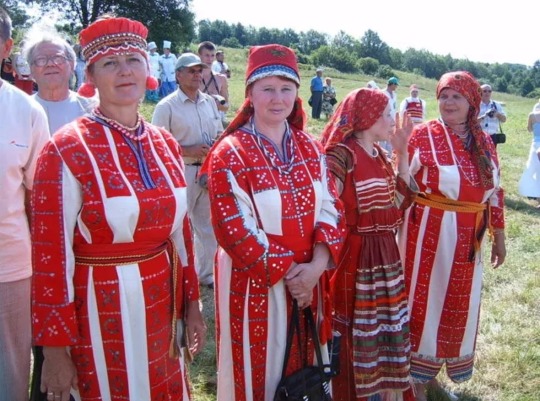
Erzya women from Penza Oblast dressed in traditional clothes. Source: Wikipedia
Activists of the Buryat national movement Dorjo Dugarov and Rajana Dugar-De Ponte, who co-founded the platform, believe that uniting different national movements around the struggle for freedom and political subjectivity will have a cumulative effect – in particular, open new opportunities for the members to convey their ideas on different international platforms.
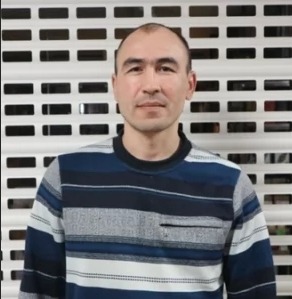
Activist Ruslan Gabbasov from Russia’s Republic of Bashkortostan. Photo: Idel Realii
Activist Ruslan Gabbasov from Russia’s Republic of Bashkortostan, who fled Russia in December 2021 fearing for his safety and obtained political asylum in Lithuania, is a representative of the Bashkir national movement.
“I believe that all constituent subjects, as well as all indigenous peoples of the Russian Federation have the right to participate in the discussion on the future of Russian territories and to exercise their right to self-determination,”said Gabbasov .
The initiators of the League of Free Nations are as follows:
Vladimir Dovdanov, Batyr Bormongaev, Erenzen Doliaev(Kalmyks, Republic of Ralmykia)
Ruslan Gabbasov(Bashkir, Republic of Bashkortostan)
Sires Bolen and Vitaliy Romashkin(Erzyas, one of the peoples of the Republic of Mordovia)
Dorjo Dugarov, Rajana Dugar-De Ponte(Buryats, Republic of Buryatia)
Today, the members of the League of Free Nations call for the establishment of direct contacts with European, Turkish and Kazakh public organizations and political parties.
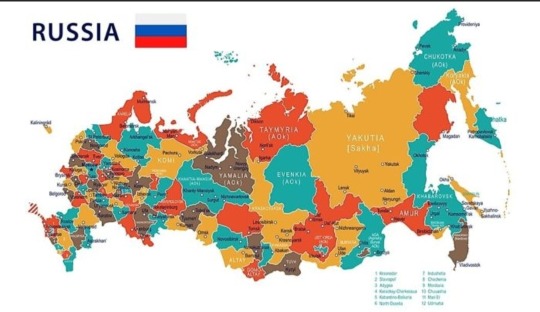
Administrative mao of the Russian Federation. Photo: World Atlas
Editor’s Note
Background
According to its constitution, the Russian Federation is divided into 85 federal subjects, 22 of which are republics. Republics are administrative divisions originally created as nation states to represent areas of non-Russian ethnicity. The indigenous ethnic group that gives its name to the republic is referred to as the titular nationality. However, due to decades of Russian migration, each nationality is not necessarily a majority of a republic’s population.
During his long years in power, Vladimir Putin has launched several centralization reforms which steadily eradicated all autonomy the republics had, with the exception of Chechnya. All bilateral agreements were abolished and in practice all power rests with the central federal government.
In fact, some experts believe that Russia has ceased to be a federation.
#indigenous#culture#indigenous russia#indigenous russian#russia#important#fypシ#colonization#fypage#landback#siberian indigenous#indigenous siberian#siberian#siberia#indigenous rights#indigenous people#freenations#League of Free Nations#russian imperialism
71 notes
·
View notes
Text
September 25th, 2022
The cries for help of Russia's national minorities: "We will stop existing"
"In small villages, with two or three streets, they have taken all the men" • Putin's draft mobilization punishes regions like Yakutia, Buryatia and Dagestan.
On the day after declaring partial mobilization in Russia, a member of the Duma [Russian Parliament] and ex-mayor of Jakutsk, in Siberia, protested that the number of reserves that each region has to send to the front [of the war in Ukraine] didn't match. She asked why regions like Novosibirsk only mobilize 0.27% of the men between ages 20 and 59 and, at the same time, Yakutia has to mobilize 1.66%. In addition, she added, why are precisely the most disadvantaged towns of the north of Yakutia where the proportion of men called to war is higher? "In villages of the Artic, with 300 inhabitants, they take 47 men. I know what it means to live in the north at -55°C [-67°F] and, without the men, families will have a very hard time. What is the logic behind these numbers? What kind of proportionality are we talking about?"
Yakutia, located north of the permafrost and almost 8,500 km away from Moscow, is a land rich in natural resources (diamonds, uranium, hydrocarbon...) and the immigration of workers for the extraction businesses has left Yakuts and Evens, the indigenous peoples, as a minority in the cities of the centre and south of the Republic. On the other hand, they are the majority in the towns of the north, from which they are now being sent en masse to the frontline.
We have talked to Aanis, a girl from a town of 500 inhabitants where 35 men have been called to war: "They've taken almost all young men from the town, of local ethnicities (Evens and Yakuts). It was very unexpected, nobody could have seen something like this coming. Before the mobilization, people from the town were not interested in the war, it's hard enough to survive. We were worried about everyday problems: hunting, how the vegetables were growing... Now everything has changed, we are shocked."
Nikolai, a man from a village in the north of Yakutia, answers resolutely when we ask what has happened: "We had never seen before what is happening now, not even in the Second World War. They have sent all the native men to the front." I ask him for more details: "My village is inhabited only by Yakuts and Evens. We're less than 500 people, out of which only 154 are of working age, including women. They have called to the front 65 people, almost all the men between ages 18 and 60." He adds that families don't know how they will survive this winter. "It reaches -60°C [-76°F], and we don't have centralised heating or water pipes. We use ovens to warm up and it's usually men who take care of that. We live from hunting. Who will hunt now? What will we eat? Nobody knows."
I ask him why does he think the authorities have decided to take them and not others: "Because we live in remote and very small villages, with no Internet; there are no lawyers here or organizations that defend us. Many of us don't speak Russian or English. They probably calculated that mobilizing us would have little repercussion: very few people would notice the absence of some minorities, even if they disappear completely. In fact, there's already few of us left.
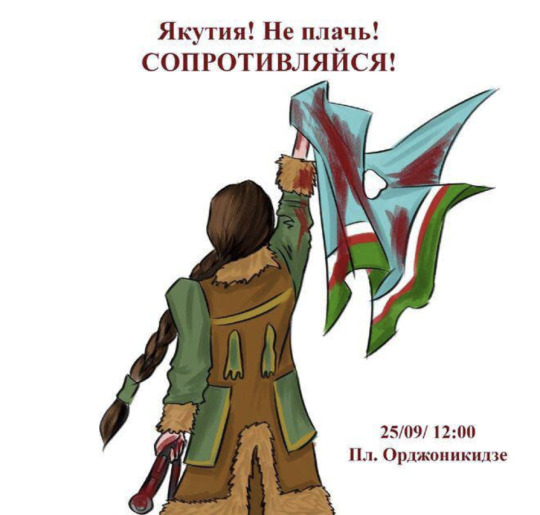
Poster calling for a protest of the Free Yakutia Foundation: "Yakutia! Don't cry! RESIST!"
In Yakutia, women have taken the streets to protest. They stand their ground. And they have done so, shouting "no to genocide!"
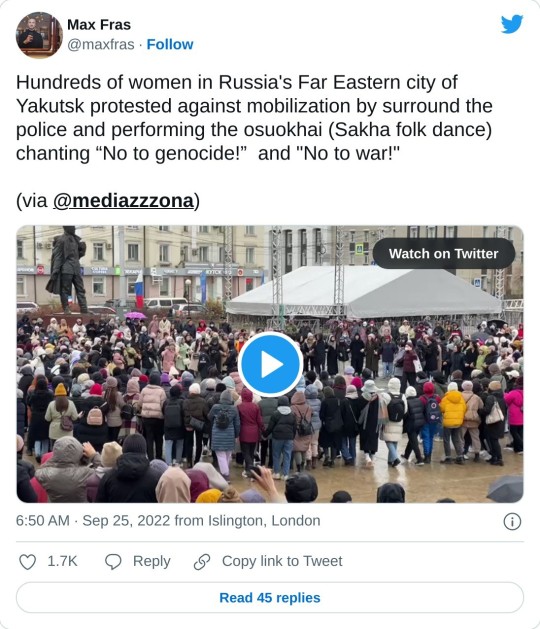
General mobilization in Buryatia
In Buryatia, a republic in the south of Siberia, bordering Mongolia, with a 35% native population of Mongolian origin (Buryats), their situation is just as harsh. "The mobilization in Buryatia is general, not partial", declares Aleksandra Garmazhapova, founder of a local NGO. Viktoriya Maladaeva, coordinator of the Free Buryatia Foundation, confirms it: "They're not calling up only reserves: they mobilize students, disabled people, and people who have never had any relation with the army. In small villages, with only two or three streets, they have taken all the men. There are families where they've called up the fathers and sons." She explains that many men were taken to the recruitment points during the night: "Then people started calling each other, and those who could drove their car to Mongolia. Others have hidden in the forests, in the taiga."
To answer to this situation, the ex-president of Mongolia (2009-2017) Tsakhiagiin Elbegdorj published the following message: "I know that since the beginning of this bloody war, the ethnic minorities that live in Russia are the ones that have suffered the most: the Mongols of Buryatia, of Tuva and Kalmykia have suffered. They have been used as cannon fodder. We, the Mongols, will welcome you with open arms and hearts. Our borders will stay open."
To the question of why she thinks Buryatia is disproportionately affected by the mobilization, Maladaeva answers without a doubt: "Because we are an ethnic minority and for Putin we are worthless [...] And that's the same in other "ethnic republics": right now we're getting calls from activists from Kalmykia, Chuvashia, Yakutia, Tuva... On the contrary, in the Irkutsk region (where there is a Slavic majority without notable minorities), there's silence, even though it borders us. Why?"
Dead in combat
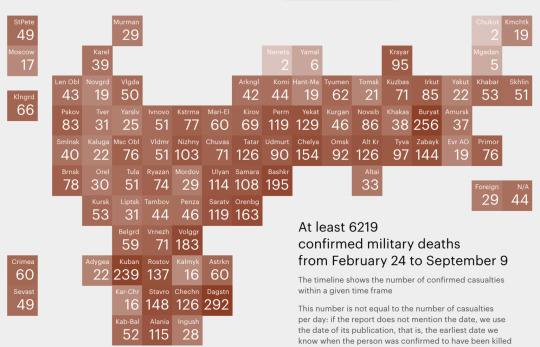
"Russian victims in Ukraine". Data compiled by Mediazona.
We must highlight that, until Putin signed the decree to mobilize reserves last Wednesday, going to fight in Ukraine was voluntary and paid. Those interested signed a contract with the Russian army and got paid a monthly salary between 130,000 and 200,000 rubles, depending on the region.
These salaries might not be much in Moscow, but they are a fortune in the most deprived areas. In the Russian capital city, the average monthly wage is about 115,009 rubles, three times the average monthly wage in Buryatia. If we look at unemployment rates, we see how it's 1.5% in Saint Petersburg while in Northern Caucasus republics, such as Ingushetia, it's as high as 30%. In the context of these economic inequalities, a result of highly centralized policies that center the economic wealth around the cities where political power resides and regulate the periphery to misery, it's no surprise that Buryats and Caucasians see an opportunity in an army wage, and knowing that in the worst of cases, if they die in combat, their families will receive (in theory) a compensation of 7 million rubles and a pension.
These economic reasons explain, in part, why the two regions with the most soldiers who died in combat in Ukraine are Buryatia and Dagestan (in the northern Caucasus). According to official data compiled by the Russian news portal Mediazona, 6,219 Russian soldiers have died in total in the war in Ukraine. From Buryatia, 256 have died (out of a total of 1 million inhabitants), and from Dagestan, 292 (out of 2.5 million inhabitants). These numbers contrast highly with the 17 dead soldiers from Moscow (12 million inhabitants) or the 49 deaths from Saint Petersburg (5 million inhabitants).
"We are the empire's trash"
Another factor that deepens the marginalization of minorities in Russia, that could have contributed to their disproportionate enlistment, is the prevailing racism in Russian society. Maria Viushkova, analyst of the Free Buryatia Foundation, declared in an interview: "The best alternatives in Buryatia for finding a job are either emigrating to South Korea or joining the army. For us, it's difficult to find work in other regions of Russia, where Buryats have to face discrimination and racism: they don't hire them, they don't house them, they limit their education. Often, Buryats who have tried their luck in other regions of Russia are forced to come back."
Aslan is a man from Kabardino-Balkaria, near Dagestan. He confirms that racism towards Caucasians is noticeable in Moscow, where he worked in some years: "It's constant. At work, first they looked badly at me, it took them a while to trust me. And when they knew me well, sometimes they spoke badly of Caucasians using a slur that they use to define us, "chernojopie" (black butts), not even realising I was there. In the subway, I have had problems with nationalists because of my looks. And my child has had quarrels with his friends for not being "Russian".
I ask him why he thinks it's them and Siberian minorities who are the most affected by this war. He's resolute: "Because we are the empire's trash to the Kremlin, and this is a way to get rid of us." And he adds: "But I don't understand why the Northern peoples don't rebel against Moscow, the empire has also wanted to destroy them. I think mobilization hasn't been as numerous in our republics in the Caucasus as it has in the Far East because they don't dare to, they know we'll stand up to them."
Aslan is probably right. The Caucasus is a potentially explosive region, where there was for years a Jihadist armed group made of young radicalized people with no hopes for the future. Authorities are not interested in feeding discontent and rage among these young people.
But in the Far East and in Siberia the situation is different, and the natives make a request of us. When I asked Nikolai, from the village in Yakutia that has been left with no young men, how could we help them, he said: "Please, report about the minority nations. If all men go to war, the genetic reserve of our people will be gone. In 20 years, or 40 years, our language will also go extinct. We will stop existing."
#war in ukraine#ukraine invasion#national minorities#ethnic minorities#russia#racism#yakutia#buryatia#dagestan#siberia#indigenous#evens#yakuts#tuva#kalmykia#kabardino-balkaria#caucasus#stateless nations#💬#genocide
237 notes
·
View notes
Text
Pathologic fans! I am calling on you all for something very important. If you have ever researched or referenced Buryat language or culture for your fanworks, or enjoyed someone else having done so, here is something you can do for the real people.
There’s an organization called Free Buryatia Foundation that is against the war in Ukraine and is currently trying to help draft dodgers escape to Mongolia, since Buryatia is one of the most heavily recruited regions. It’s a very poor part of Russia, and many people go into the army out of necessity. Unfortunately, this has led to the world seeing the Buryat people in a negative light because of the unconscionable acts of some of the members of the army. Help those Buryats who don’t want war and don’t want to be killed far from their home in a useless, stupid imperial land grab!
https://freeburyatia.taplink.ws
171 notes
·
View notes
Note
Hi,
I'm not indigenous so you can dismiss this as being overstepping if you want and you'd have every right to as a native person. I was thinking of maybe sending this on anon but anon messages are far easier to be construed as bad faith (I want to stress I'm not sending you this ask to dunk on you or ague with you or something) and also I think it's best to be honest so I'm doing this off anon.
I'll admit I was personally kind of uncomfortable at your Koryak Russia headcanon when I saw it, particularly because of the history regarding the Russian colonisation of Siberia, and especially because you chose the Koryaks in particular. However I am not indigenous so of course my opinion is definitely not one which should be amplified. I just want to give some context on Siberia/the Koryaks which might help explain further why the Koryak anon was upset.
Unlike the USA, Russia was an already established country when it undertook its colonisation of the far East. The indigenous Siberians were never originally "Russian" and had very little to no contact with Russians before the Russians invaded, and, again, Russia was an already established country at that point. The formation of Russia as a nation had nothing to do with engaging with Siberian indigenous, however Russia as we know it today with its huge landmass is a result of the later Russian colonisation of Siberia (Tsardom of Russia established 1547, Russia began its invasion of Siberia in 1580).
I didn't want to say anything because well I'm not a Koryak nor am I am indigenous Siberian nor am I indigenous at all however seeing as a Koryak spoke out, I just wanted to give a little more context of Russia's treatment of Siberian indigenous and Koryaks in particular. Again, I'm not sending this ask to shout at you, I just wanted to give further context.
Russia, as the previous Koryak anon pointed out, has been disproportionately mobilising indigenous Siberians, hence why the "Free Buryatia Foundation" was founded in an attempt to combat this, I've made some posts on this myself, including the recent Russian crack down on Siberian activists in which they've sentenced the leader of Free Buryatia to 7 years in prison.
Indigenous Siberian soldiers in Ukraine have also been frequently scapegoated for Russian war crimes committed in Ukraine, including by the Pope himself,
"The cruelest are perhaps those who are of Russia but are not of the Russian tradition, such as the Chechens, the Buryats and so on,” he said."
https://www.google.com/amp/s/amp.cnn.com/cnn/2022/11/29/europe/pope-francis-chechens-buryats-intl/index.html
Not only do indigenous Siberians face Russification, grapple with the Kremlins mistreatment of them and suffer from disproportionate mobilisation, but they are also being scapegoated for the brunt of Russian war crimes in Ukraine
https://www.media-diversity.org/the-savage-warriors-of-siberia-how-an-ethnic-minority-in-russia-came-to-be-unfairly-blamed-for-the-worst-war-crimes-in-ukraine/
To give some further context on Russia's treatment of the Koryaks in particular, not the full history but:
In the 1930s Koryak children were sent to boarding schools, where they were expected to adopt new ideas, including anti-religious views and criticisms towards their own traditions. This led to the loss of their natural way of life and traditions, with many Koryak settlements forcibly disbanded. In 1954, the teaching of the Koryak language was banned - this lasted for 2 decades. Affluent herders and shamans were executed during Stalins reign.
I can only find one source which says this so take it with a grain of salt , but nuclear testing. Apparently nuclear tests in the 1950s and 1960s caused severe problems for the Koryaks. Radioactive contamination harmed their immune system. Reindeer-herders' bones contain significantly more lead and caesium, resulting in a surge in diseases. Again, I could only find 1 source for this which is why I said "apparently" however regardless of if this factoid in particular is true or false doesn't necessarily take away from Russia's overall mistreatment of them.
On the Koryak infant mortality rate: "Infant mortality is also very high..The highest rates recorded in official statistics are among the Koryak, at 52.6 per 1000" (Peoples of the Arctic: Characteristics of Human Populations Relevant to Pollution Issues)
The average Koryak lifespan at one point was less than 50 years and iirc it's still quite low.
When it comes to their fishing:
"In September 2014, the parliamentary assembly of Kamchatka Krai introduced a bill aimed at reconsidering the management of those territories that have been traditionally used by indigenous peoples. The bill set out a proposal to considerably reduce their area and to prevent indigenous peoples from cultivating the land in the south of the Kamchatka Krai region – a move that deprives many of the ability to maintain traditional livelihoods such as fishing."
https://minorityrights.org/minorities/koryaks/
I'm not trying to point a finger at you because I'm sure you did not have any bad intentions with your post especially because you yourself are native and I'm not so I would be seriously overstepping, and of course it's always amazing to see more indigenous rep and I myself have my own Siberian ocs, but I just wanted to try and give some further context as to why perhaps the Koryak anon was upset at your depiction, however again I'm not indigenous so my opinion on the matter holds a hell of a lot of less weight. You don't have to feel obligated to post this, I know it's a heavy subject, and again I'm not indigenous/native so you could just dismiss this all if you wish. I hope this didn't come across as me overstepping
I truly appreciate your taking the time to message me. I do not mind, as anyone who recognizes something is wrong should say something. Being native does not excuse my choices, so please don't feel bad for correcting me or adding context.
I mentioned my intentions in the anon's ask because I wanted them to know my making Russia Koryaki was not to erase these humanitarian injustices, but to see a character I adore as indigenous. No matter my intentions, I should have known better than to connect an oppressed native culture that I have no connection to, to the literal embodiment of its invader.
Your message is important to me and because you used multiple sources, I do want to share it as it is a great way for more people outside of Russia to know about the plight of Koryak people. To the anon, I altruistically apologize for my depictions.
7 notes
·
View notes
Note
FREE TIBET! INDEPENDENCE FOR SIBERIA! FREE HONG KONG! INDEPENDENCE FOR GREENLAND! REPRESENTATION FOR THE NAVAJO NATION! BLACK HILLS LAND BACK! STATEHOOD FOR PUERTO RICO AND DC! INDEPENDENCE FOR INNER MONGOLIA! FREE KURDISTAN! INDEPENDENCE FOR ASSYRIA! FREE BALOCHISTAN! FREE BURYATIA! FREE BALI! FREE OKINAWA! FREE TAIWAN! #PayAttentionToTheWorldYouAreLivingIn 🌎 🌍 🌏
WOOHOOOO!!!!!
6 notes
·
View notes
Note
Hello. I've been following you for a while and I know that you organize fundraisers to help those in need. That's why I want to ask. What is happening to Buryatia and why did you decide to help this particular republic?
Hello! Thank you for following me! <3
Before I start, sorry if my English is not the best. I'm still learning and improving. If you don't understand something I wrote, please ask me in the comments and I will clarify.
Yes, for now I'm cooperating for a fundraiser for Maria. Her mom is going through cancer treatment and the situation is not the best.
On the other hand, I also shared a fundraiser (which is not organized by me) from Free Buryatia.
Free Buryatia is an organization created in 2022 to help those who were against the Russian-Ukraine war. This foundation speaks about the systematic abuse the Buryats are experiencing during this war, as they are the minority which death toll is the highest in all the Russian Federation.
I must say other minorities are also in a similar situation. Tuvans, Yakuts, Dagestanis... all the minorities (and ethnic russians from rural places as well) are being drafted in mass to the frontlines, while the muscovites are not.
Also, the drafted men sometimes need to buy their own equipment, as the equipment given by the army is not enough for facing the harsh winter, or secure enough. This means only those who can afford to pay for their own weapons, boots and everything will survive. And who are those that can afford it? The muscovites....
Of course a lot of them have tried to fee away from the Russian Federation (a lot are right now in Mongolia and Kazakhstan, for example) but others are facing trials for trying to escape. Free Buryatia provides lawyers for them, and they have also done a great work by sharing everything that is happening with us.
Sorry for the long post! If you want to know more you can DM me. I don't bite :)
If you want to read more/donate, here is their website:
Here is an useful article as well:
#buryatia#russian imperialism#ukraine#russian ukraine war#special military operation#siberia#indigenous russia
2 notes
·
View notes
Text
Important to note: Russia did this in September of last year (2023).
The Free Buryatia movement has been labelled as a foreign "pseudo-rights" group by Russia's general prosecutor due to it's leadership residing outside of Russia.
Russian authorities fear that the Free Buryatia movement will create mass support for separatist movements within Russia.
The Free Buryatia movement was established in March 2022 as a response to Russia's invasion of Ukraine and it's activism revolves around spreading awareness of the mistreatment of Buryats (and other ethnic minority groups) in Russia, especially amidst the invasion of Ukraine and the disproportionate mobilisation of people from these regions, helping Buryat men leave their contracts with the Russian military and escape conscription + offering them legal counsel.
Important to note: Alexandra Garmazhapova resides outside of Russia - she has thankfully not been jailed. This happened in November of last year - one month after Russia declared the free Buryatia movement "undesirable."
Please spread awareness and donate what you can if you're able to:
#Russia#russian imperialism#Russian colonisation#Buryatia#Free buryatia#Free Buryatia Foundation#Ukraine#Invasion of Ukraine#Buryats#Russia having a normal one
7 notes
·
View notes
Note
two interesting things I saw on twitter about Russia and Ukraine
"Retired US general: Ukrainian army could enter Crimea by mid-2023."
"A top Russian economist warns it will “die by winter.”"
thoughts on these two ideas?
I think, if Ukraine continues its military successes and if Russia continues to struggle with holding ground, then Retired Lieutenant General Ben Rhodes is probably not that far off.
I think Inozemtsev's analysis is probably pretty accurate - I'll quote the article below in full:
In the seven months since Russia invaded Ukraine, some have argued that the international sanctions levied against Russia weren’t strong enough as Russians continued to travel, shop, party—and generally lead a normal life.
Now, an action by Russian President Vladimir Putin could be the catalyst that brings the war home to Russians and plunges the economy into real catastrophe.
Last Wednesday, Putin announced a “partial” mobilization—Russia’s first mobilization decree since World War II—ordering 300,000 able-bodied men aged 18 to 30 in the military reserves to fight in Ukraine, sparking widespread protests across the country.
“I consider it necessary to make [this] decision, which is fully appropriate to the threats we face…to protect our motherland…to ensure the safety of our people and people in the liberated territories,” Putin said last week.
In the days that followed, Russian police arrested over 2,300 citizens for protesting, and tens of thousands of Russians have now fled the country to avoid the draft.
Now, Russian economist Vladislav Inozemtsev, the director of Moscow-based think tank the Center for Research on Post-Industrial Studies, is warning that Putin’s mobilization will have “truly catastrophic consequences,” including the death of the Russian economy and the downfall of Putin’s regime.
“The Russian economy is going to die by winter, I wrote in early March. Now I think I was right. The mobilization announced on Sept. 21 was a milestone that really divided Russian history into ‘before’ and ‘after’—an event that began the final countdown of Putin’s era,” the economist wrote on Sunday for Russian publication The Insider.
‘I don’t want to die for someone else’s ambitions’
Putin’s mobilization decree has already proved highly unpopular in Russia, prompting mass rallies and protest actions.
On Monday, a gunman opened fire at a military recruitment office in the Siberian region of Irkutsk, injuring one person. The gunman’s identity and motivation have not been disclosed. In Ryazan, a city 115 miles southeast of Moscow, a man set himself on fire, shouting that he didn’t want to fight in Ukraine. Over the weekend, at least 400 people—mostly women—protested in Yakutsk’s city centre, telling police to “let our children live.”
Several reports from independent media publications and researchers note that the Kremlin is likely aiming to draft over 1.2 million men to fight in Ukraine—four times more than the 300,000 the government says it’s recruiting. The Kremlin’s press secretary Dmitry Peskov has denied this claim.
Police and recruitment officers have also rounded up students, after Putin specifically said that university students studying full-time would not be called up to serve in Ukraine. Meanwhile, antiwar activists have denounced the government for disproportionately sending ethnic minorities from its Siberian and Caucasus regions to fight in Ukraine. Almost half of the male population in Buryatia, an eastern Siberian region colonized by Russia in the 18th century, have been brought to military assembly points from rural villages, according to independent media reports.
“Mobilization is not partial…in Buryatia. Summons come to students, pensioners, fathers of many children, people with disabilities,” Alexandra Garmazhapova, president of the Free Buryatia Foundation, told CNN.
In a move that shows how far the Kremlin is willing to go to ensure its mobilization demands are met, Putin signed an additional law on Saturday that approves jail terms of up to 10 years for those evading military duty and up to 15 years for wartime desertion.
Catastrophic consequences
Prior to Putin’s mobilization decree, Inozemtsev agreed with predictions that Russia’s GDP would drop around 4–5% this year. But now he believes that Russia’s GDP will drop that much in October alone, and the “next months will only consolidate the trend. Now my spring forecast for a 10% fall seems almost too optimistic,” he said.
The Kremlin’s exclusive focus on mobilization and war efforts means that government funds will be directed to these initiatives at the expense of investment in business and the economy, the economist predicts.
Investments in business will begin to decline sharply, and the Moscow Stock Exchange could dip below 1,500 points before year’s end, Inozemtsev wrote.
“And all this doesn’t take into account…the inevitable new wave of [Western] sanctions that will be announced in the near future. We are talking about a much more radical-than-expected displacement of Russia from energy markets and a new wave of restrictions on the supply of critical [imports] for the country,” he said.
The “financial effects of mobilization—in the medium-term—will be significantly greater than the consequences of…the war in Ukraine,” Inozemtsev said.
In Russia’s poorer regions like Buryatia, the economic consequences will be disastrous, as “thousands of families will be left without income, and local medium and small businesses will simply die out,” Inozemtsev wrote.
Russia will also lose at minimum hundreds of thousands of men to the war’s frontline, and 3 to 4 million more will “disappear” from the labor market,” he wrote. In Russia’s wealthier cities like Moscow and St. Petersburg, residents generally have more resources to leave the country. But Inozemtsev predicts that army officers in the next few days will start serving recruitment papers at people’s workplaces, leading many to quit, or simply not show up at their offices, to avoid getting a summons.
“This will be the strongest blow to the economy. Several million people will prefer to quit their jobs so as not to [serve] in the army. Meanwhile in large cities… the loss of even a few employees can cause disproportionate damage to the economy. Russia is the economy of large cities and companies,” he said.
22 notes
·
View notes
Text
Daily Wrap Up September 22, 2022
Under the cut:
Russia will on Friday begin its plan to annex around 15% of Ukrainian territory via referendums in four regions controlled by Russian forces, a move the West says is a gross violation of international law that significantly escalates the war
Summons delivered to eligible men at midnight. Schoolteachers pressed into handing out draft notices. Men given an hour to pack their things and appear at draft centres. Women sobbing as they send their husbands and sons off to fight in Russia’s war in Ukraine. The first full day of Russia’s first mobilisation since the second world war produced emotional showdowns at draft centres and even signs of protest. And it appears Russia could be considering far more than the 300,000 new conscripts claimed by the defence minister, Sergei Shoigu
The head of Ukraine's military intelligence said on Thursday the percentage of released Ukrainian prisoners of war who had suffered torture while in Russian detention was "rather high"
“Russia will on Friday begin its plan to annex around 15% of Ukrainian territory via referendums in four regions controlled by Russian forces, a move the West says is a gross violation of international law that significantly escalates the war.
After nearly seven months of war, and a critical battlefield defeat in northeastern Ukraine earlier this month, President Vladimir Putin explicitly backed the referendums after the Russian-controlled regions lined up to ask for swift votes to join Russia.
The self-styled Donetsk (DPR) and the Luhansk People's Republics (LPR), which Putin recognised as independent just before the invasion, and Russian-installed administrations in the Kherson and Zaporizhzhia regions will hold votes.
The voting, which the West and Ukraine says is a sham, is due to begin on Friday and will end on Tuesday, with results expected soon afterwards.
Russia will formally annex the areas after the results.
"The Kremlin is organizing a sham referenda to try to annex parts of Ukraine," U.S. President Joe Biden told the 77th Session of the United Nations General Assembly.
"Ukraine has the same rights that belong to every sovereign nation. We will stand in solidarity with Ukraine," said Biden, who cast the war as part of a global contest between democracy and autocracy.
Ukraine, whose post-Soviet borders Russia recognised under the 1994 Budapest Memorandum, says it will never accept Russian control of any of its territory and will fight until the last Russian soldier is ejected.”-via Reuters
~
“Summons delivered to eligible men at midnight. Schoolteachers pressed into handing out draft notices. Men given an hour to pack their things and appear at draft centres. Women sobbing as they send their husbands and sons off to fight in Russia’s war in Ukraine.
The first full day of Russia’s first mobilisation since the second world war produced emotional showdowns at draft centres and even signs of protest. And it appears Russia could be considering far more than the 300,000 new conscripts claimed by the defence minister, Sergei Shoigu.
One woman in a village in the Zakamensky region of Buryatia, eastern Siberia, said she first felt something was amiss when the dogs began barking at about midnight.
In a community of 450 people, the village head was walking from house to house, seeking to hand out more than 20 draft notices. As men gathered before departing the next morning, she said, some drank vodka, while others hugged and told each other to stay safe. Women cried and made the sign of the cross over the small minibus that carried them away.
“It’s not a partial mobilisation, it’s a 100% mobilisation,” said Alexandra Garmazhapova, the president of the Free Buryatia Foundation, an activist group that has reported on the draft in the region. In the past day, she said, she and her colleagues had received and identified more than 3,000 reports of povestka, or draft papers, being delivered in Buryatia within just 24 hours of Vladimir Putin announcing the draft.”-via The Guardian
~
“The head of Ukraine's military intelligence said on Thursday the percentage of released Ukrainian prisoners of war who had suffered torture while in Russian detention was "rather high".
Kyrylo Budanov was speaking at a news conference a day after a prisoner swap was agreed between Russia and Ukraine involving almost 300 people, including foreigners.
Some of the Ukrainian POWs released by Russia were currently receiving rehabilitation in hospital in Ukraine, the country's interior minister, Denys Monastyrskyi, told the same news conference.”-via Reuters
21 notes
·
View notes
Text
Anti-War Initiatives Led by Indigenous Peoples in Russia are Inherently Anti-Colonialist
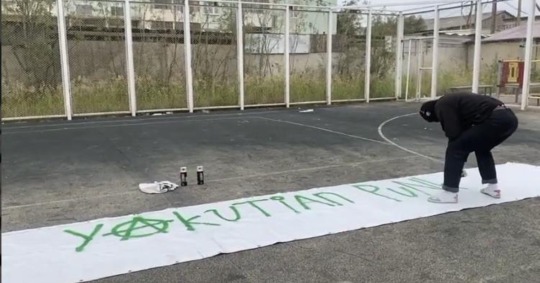
By Anonymous
Anti-war movements in Russia immediately appeared at the onset of Russia’s invasion of Ukraine. Notably, these initiatives were and are by and large driven by preexisting feminist organizations (The Social Democratic Alternative, Eighth Initiative Group, Eve’s Ribs, the Agasshin Project, and the Feminist Translocalities Projectto name a few) and Indigenous and ethnic minority groups founded in direct response to the war. While currently there is no sole, centralized movement uniting the country’s numerous Indigenous Peoples and ethnic minorities, the appearance of various anti-war organizations, media accounts, and content, and action points to a rather unprecedented impetus of collaboration and solidarity focused on condemnation of the Russia state’s actions.
Further unparalleled is the overt and widespread presence of anti-colonialist and anti-imperialist sentiment as activists and laypeople alike criticize Russia’s attack on Ukraine and probe into the federation’s enduring issues of coloniality in quotidian life (racism, discrimination, xenophobia, and the violence they encourage). The invasion of Ukraine is not new or covert; rather, it represents the next steps in a long and ongoing history of Russian colonial understanding of a sovereign Ukrainian nation and distinct Ukrainian culture as a threat needing mitigation. These anti-war, staunchly anti-colonialist, and Indigenous-led initiatives are small in number but increasingly outsized in influence. From the use of native languages in anti-war campaigns to overt castigation of Russian chauvinism, these initiatives point to resistance to both the ongoing war and colonial policy. Their importance cannot be overemphasized since their efforts contribute to a better understanding of, and subsequently, better capacity for dismantling Russian coloniality.
Russia’s claims that it is fighting “neo-Nazis” in Ukraine is a blatant distortion of history, and the irony of this claim is far from lost on many Indigenous Peoples of Russia who grew up in a society steeped in Russian colonialism and who witness growing ethnic Russian nationalism (often abetted by right-wing and neo-Nazi sentiment) on societal and institutional levels (e.g., ethnic Russian nationalism enshrined in the federal constitution since 2020).
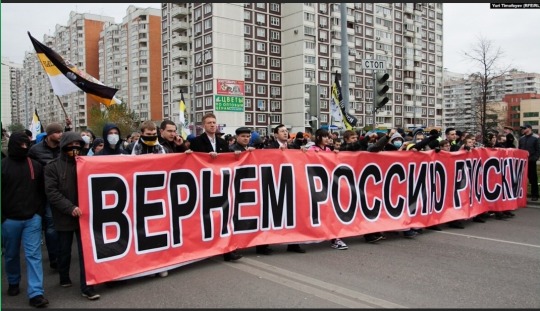
Image: Russian ultranationalist march in the "Russia March" in Moscow on Nov 4, 2011. The banner they carry reads "Return Russia to [ethnic] Russians". Yuri Timofeyev for RFE/RL.
Anti-war movements like the Free Buryatia Foundation––the first anti-war initiative started in response to Russia’s invasion of Ukraine and on behalf of an ethnic group––emphasize this paradox and use the current conflict to advocate for a reckoning with historic racism and imperialism within Russia’s own borders. The objective of The Free Buryatia Foundation(Buryats Against the War) is twofold––to fight against the war on Ukraine and to “solve the problem of racism and xenophobia in Russia”. Founder and president of the fund, Alexandra Garmazhapova, says such an organization was needed for a number of reasons: the disproportionate number of Buryat soldiers dying in the war, the overrepresentation in media of Buryats as the main perpetrators of violence, and the latent systemic factors that usher Buryats into military service.
“Our region has been the leader in losses since the very beginning of the war, and it was important for us to declare that we are Buryats, and we are against the war. We consider the war with Ukraine xenophobic, because if Russia had a tolerant society, the idea of ‘denazification’ of Ukraine…would not find support among Russians. The Indigenous Peoples of Russia have been and are being subjected to ‘denazification’, which in reality is complete Russification. We understand what it’s like to have your language and culture banned… Residents of ethnic republics who go to Moscow and St. Petersburg face xenophobia and racism… But at the same time, military personnel from [the ethnic republics] are sent to Ukraine to protect the ‘Russian world’,” Garmazhapova said in an interviewin July.
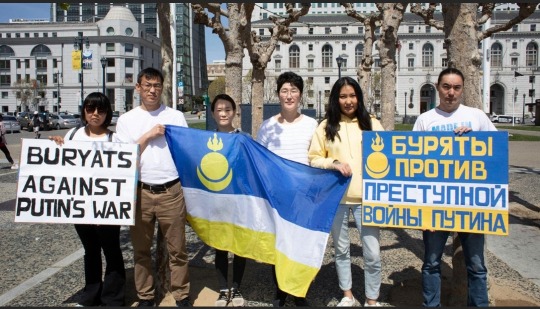
Image: Activists at a rally against the war in Ukraine in San Francisco holding signs that read "Buryats against Putin's [criminal] war" and the flag of Buryatia. Courtesy of Alexandra Garmazhapova's Facebook page.
The Free Buryatia Foundation tracks statistics on losses during the war, provides legal advice to help military personnel terminate their contracts, shares credible information to combat propaganda and misinformation, and strives to prevent Russian servicemen from going to Ukraine. The organization is very active on social media sites and regularly collaborates with specialists, activists, and other anti-war initiatives on live-streamed discussions, data collection and sharing, and crowdsourcing.
Most of the Free Buryatia Foundation’s team resides outside the Russian Federation, which shields them from Russia’s growing restrictive legislation, namely “fake news” laws, which criminalize the dissemination of false information about the Russian army and is used by the state to censor, detain, and imprison those who oppose the war. For that reason, there are no large-scale Indigenous-led anti-war organizations or groups based in Russia. Disparate groups and media accounts exist though they tend to maintain anonymity and much of their activism work is shared or takes place on Instagram (only accessible with use of a VPN) and Telegram. These include, but are not limited to the Sakha Pacifist Association, New Tuva Movement, and Asians of Russia(which existed prior to the war but shifted its focus to information about the war and protests), which share information specific to their respective regions in addition to sharing information among each other.
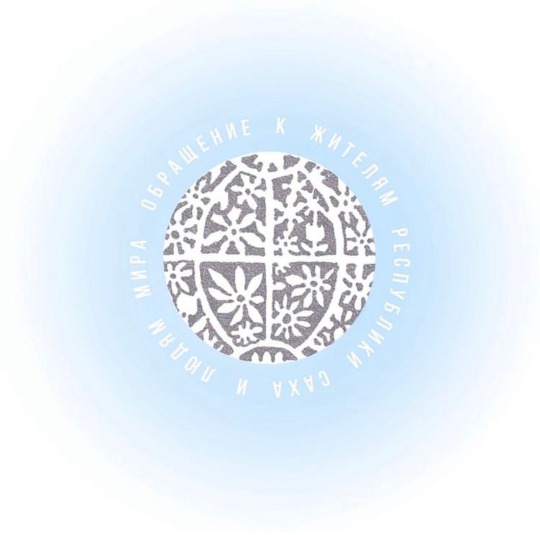
Image: Symbol of the Sakha Pacifist Association with text reading "An appeal to the residents of the Sakha Republic and the people of the world." Courtesy of https://www.instagram.com/sakha_pacifist_association/

Image: A post from the New Tuva Movement's Instagram page with text reading "Tuvinians against war!" Courtesy of https://www.instagram.com/new_tuva/
Indigenous individuals are actively engaged in anti-war actions though they are targeted by the Russian Federal Security Service and the Center for Combating Extremism (unit in the Ministry of Internal Affairs). The social media pages for various groups often crowdsource funding these activists need for legal aid. While the groups are not organized or affiliated, through their sharing of each other’s posts and through collaborations, they’re forming a kind of network––one that is able to exist under the current Russian state. Through posts on social media are seemingly low-impact, these groups are harnessing social media as a tool to disseminate information restricted by the state and state-run media and building networks on platforms that are relatively accessible.
There is no single position towards the war among Russia’s different Indigenous groups. These groups are often asked how individuals, who carry out demonstrations with signs saying “Tuvinians against the war”, or nameless admins, by using names such as Sakha Pacifist Association or New Tuva Movement, are able to speak for an entire people group. “These action[s] raise the rebellious spirit of the people. [They’re] very important demonstrations and actions for the entire people, as well as a message to the whole world,” wrote sakha_vs_war. The evocation of one’s nationality or cultural background is yet another tool for appealing to the public. The state and regional governments also utilize this tool in their co-opting of national cultures broadly, and of organizations such as the Russian Association of Indigenous Peoples of the North (RAIPON) and the Buddhist Traditional Sangha Center of Russia specifically, in support of hostilities against Ukraine. Identity, language, and culture are effective tools for anti-war movements in this particular case as initiatives consistently underline the imperial nature of this current war.
Given Russia’s history and continuing legacy of colonial language policy inherited from the Russian and Soviet empires (which systematically afforded/s primacy to the Russian language at the expense of native languages), anti-war slogans in Indigenous languagesare part of reclamatory cultural education which is, at its core, anti-war as it is a struggle against colonialism. The struggle around national languages in Russia is inextricably tied to state-sanctioned xenophobia and Russian supremacy. State language policy has become increasingly restrictive on native language education as Putin proclaimed in 2017 that Russian “the natural spiritual framework of the country” and that “everyone should know it”. Then, in 2018 three amendmentswere made to Law No. 273 “On Education in the Russian Federation,” which made Russian language learning compulsory at the expense of native languages. National or republican sovereignty movements of non-Russian, and overwhelmingly Indigenous, ethnic groups are thus intimately intertwined with language and cultural sovereignty, making language and culture significant areas the state and its security forces carefully scrutinize. Therefore, with this context, struggles for regional authority or autonomy and the anti-war struggle are innately linked.

Image: Anti-war poster with text in the Buryat language. By Yumzhana Sui for Agasshin.
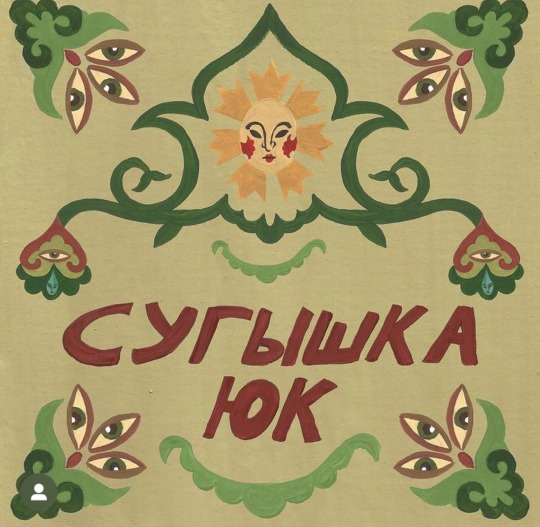
Image: Anti-war poster with text in the Tatar language. By Alisa Gorshenina for Agasshin.
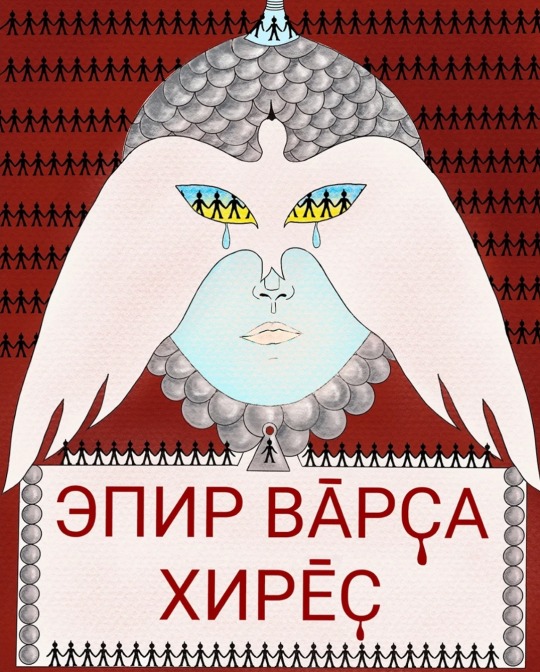
Image: Anti-war poster with text in the Chuvash language. By Polina Osipova for Agasshin.
For many activists, printing and disseminating anti-war messages in Indigenous languagesis not only symbolic of the resistance against the colonial Russian state, but also a rallying call to compatriots who might support the war or who do not openly oppose it. The Agasshin Project published a series of anti-war postersin Indigenous/national languages created by speakers of the languages (Buryat, Kalmyk, Udmurt, Chuvash) since anti-war activities in Indigenous languages “can be instruments of resistance to both the current war and colonial politics”. Aikhal Ammosov, a Sakha musician and activist, has been tried twice and is awaiting a third trialfor his anti-war picketing and performances in Sakha, Russian, and English. Ammosov was first fined for “hooliganism”, then for “discrediting the Russian armed forces”, and he currently awaits trial and could possibly face up to three years in prison for his most recent art performance involving a banner reading “Yakutian Punk Against WAR”.

Video still posted on Ammosov's Instagramaccount in which he spraypaints a banner with the text "Yakutian punk against war."
Following Russia’s February 24, 2022 invasion of Ukraine, activists around the world began publishing texts about colonialism, racism, and violence in Russia with fervor. Though these activists and groups are far from monolithic and cater to regional, historical, and culturally specific needs, these ideas spread and grow horizontally across the sphere of Russian influence, allowing for grassroots collaboration, collectivization, and support to grow.
#indigenous#indigenous russian#culture#indigenous russia#russia#important#colonization#fypシ#fypage#landback#Tuva#Sakha#Yakutia#Baryutia#indigenous people#indigenous resistance#indigenous rights#powerful
232 notes
·
View notes
Text
Russian President Vladimir Putin’s likely effort to shield ethnic Russians from high levels of mobilization may trigger resistance in some of the ethnic enclaves that seem to be disproportionately bearing the burden of war. Russian Telegram channel Rybar released a report on July 18 about the Novaya Tuva movement- an anti-war organization comprised of activists from the Tuvan ethnic minority enclave. Rybar accused the Novaya Tuva movement of disseminating anti-war propaganda and inciting ethnic discord within the Russian Federation. This report is noteworthy in the context of the recent increase in the formation of regionally-based volunteer battalions through Russia, many of which fall along distinct ethnic lines. ISW and others have previously noted the prevalence of non-ethnic Russian battalions fighting in Ukraine, which include troops from Chechnya, South Ossetia, Tuva, Tartarstan, Bashkortostan, Chuvashia, and others. These indicators suggest that Putin may be unwilling to conduct general mobilization in part due to a reluctance to mobilize large numbers of ethnic Russians. Rybar’s post as well as previous reporting on a "Free Buryatia” anti-war group bring to the fore the risk that Putin’s apparent desire to have non-Russians bear the brunt of the war at this stage could create domestic tension in these regions.
Russians unwilling to fight for Novorossiya, ironic
25 notes
·
View notes
Text
Some information on mobilization in Russia and who is getting targeted by conscription
the sources are in Russian; i will be giving summaries in English, and please feel free to use Google Translate to verify what i say
people in Chechnya, a region occupied by Russia through Chechen wars and suffering from intense levels of political oppression from the Russia-endorsed governor Ramzan Kadyrov (citizens, especially LGBTQ+ people, routinely kidnapped and murdered by the police)
~150 Chechen women* protested on September 21st, against war and for the safety of their children. dozens were detained, and their sons* picked off by the police and blackmailed into signing a "volunteer" contract to be sent to war under the threat to their parents' safety. Kadyrov has confirmed that information and reinforced his threates to any future protesters. people are being openly viciously punished for anti-war demonstrations by having their loved ones sent to fight.
on top of that, other people from "lists" kept by Chechen law enforcement are getting kidnapped and blackmailed into signing contracts (source in English). this is technically not mobilization bc they are being forced into becoming "volunteers", but we all understand this is all the same, right?
people from central and eastern regions, which get economically exploited by the government, specifically with populations largely comprised of oppressed ethnic minorities. a lot has been heard from Buryatia specifically. most targeted are small villages "with no press or opposition"
in Crimea, 80% of the mobilized so far are Crimean Tatars, a politically oppressed ethnic minority; that is 80% when they make up only 20% of the overall population
people detained at anti-war and anti-mobilization protests. cases of detained protesters receiving conscription notices were reported on the first day of protests, September 21st, and today, September 24th.
There is no set pattern of conscription that would exclude any group (it was expected people over 35 would not be the first to get conscripted, for example, but there have been many many cases of people over 50 who should not be listed in the reserve at all getting called in); it is all random and unregulated, law is feeble protection and promises from government even more so.
HOWEVER, it is already clear that this is hitting people from the already most neglected, exploited, underpriveleged groups the hardest. People "with higher education working in IT" are expected to be cleared of conscription, for one, and there will most likely be cases that show that is not at all a guarantee, but this absolutely sets a general trend of who is seen as disposable: lower-class people in regions, and people of non-slavic descent
I've seen some people here express contempt of those protesting against mobilization because "they are only waking up now that it's to save their skins", and saying they have no compassion for those trying to avoid it. I would really really ask people to reconsider that statement, seeing how the russian government is throwing citizens already routinely exploited by it into its imperial war.
Also, whatever people are moved by in their protest or attempts to escape the country, I think we should maybe all agree that Russia not getting more soldiers is a good thing? If you want to celebrate people staying in a deeply corrupt dystopian state to rot bc in your opinion they deserve that for not challening it earlier, you will also be celebrating the corrupt dystopian state receiving more taxes and fines from detainees, more SOLDIERS, and more people to brainwash. also, have i mentioned, MORE SOLDIERS.
12 notes
·
View notes